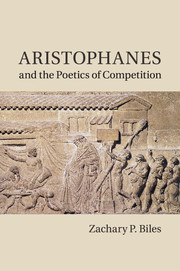Book contents
- Frontmatter
- Contents
- Acknowledgments
- List of abbreviations
- Introduction: proagon
- 1 From Thamyris to Aristophanes: the competitive poetics of the comic parabasis
- 2 The competitive partnership of Aristophanes and Dikaiopolis in Acharnians
- 3 Aristophanes' poetic tropaion: competitive didaskalia and contest records in Knights
- 4 Intertextual biography in the rivalry of Cratinus and Aristophanes
- 5 Aristophanes' Clouds-palinode
- 6 Dionysos and Dionysia in Frogs
- Bibliography
- General index
- Index of passages
Introduction: proagon
Published online by Cambridge University Press: 25 January 2011
- Frontmatter
- Contents
- Acknowledgments
- List of abbreviations
- Introduction: proagon
- 1 From Thamyris to Aristophanes: the competitive poetics of the comic parabasis
- 2 The competitive partnership of Aristophanes and Dikaiopolis in Acharnians
- 3 Aristophanes' poetic tropaion: competitive didaskalia and contest records in Knights
- 4 Intertextual biography in the rivalry of Cratinus and Aristophanes
- 5 Aristophanes' Clouds-palinode
- 6 Dionysos and Dionysia in Frogs
- Bibliography
- General index
- Index of passages
Summary
How dramatic poetry came to be associated with Dionysos and his festivals is a complicated question with no clear answer. What is certain is that by the time our evidence allows us to speak of tragedy and comedy as well-defined and distinct literary genres, they are included in a program of direct competition at Dionysian festivals. It would appear that the poetic agon was to some degree responsible for putting the genres on the cultural map, even if their cultic significance and literary antecedents go back well before this. For tragedy, official recognition came in the later part of the sixth century; for comedy we can be more precise: the first victory belonged to the all-but-forgotten Chionides in 486. Thereafter, Dionysian competitions were the occasion for dramatic production in Athens, so that by the time Aristophanes began writing comedies the genre had been embedded in an agonistic context for about sixty years. Regardless of comedy's form and character when Chionides practiced it, over the course of the fifth century the constant subjection of the productions to direct competition must have fostered experimentation and adaptation by individual poets. What we know as comedy through Aristophanes is thus likely quite distinct from its earlier form, though any assessment of the genre's development must leave room for the dynamic of innovation operating through the re-expression of a tradition.
- Type
- Chapter
- Information
- Aristophanes and the Poetics of Competition , pp. 1 - 11Publisher: Cambridge University PressPrint publication year: 2011

